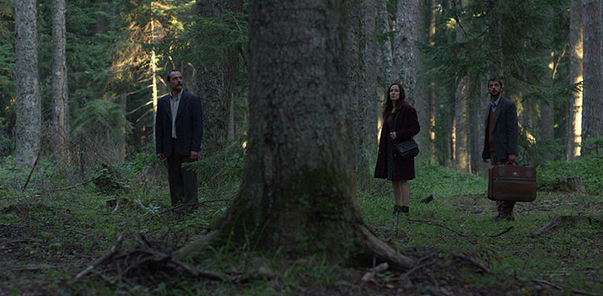Little entangling in overambitious Entanglement
by Miro Frakić

Two brothers and one woman in a remote house. It might feel rather familiar, if not too familiar a set-up in Tunç Davut's Entanglement, that got its world première as part of the 2015 competition of the Sarajevo Film Festival. The elder brother, Kemal (Muhammet Uzuner), an ex-convict, returns one day with Nalân (Defne Halman), who immediately makes herself comfortable in his home. This puts the younger brother, Cemal (Baran Sukru Babacan), in an uncomfortable position. The two brothers are very different from each other, if not complete opposites; one is harsh and raw, the other one is gentle and sensitive, which is also reflected in their physique. Predictably, with a female, motherly presence around, their fragile relationship is put to the test. On the surface, it might sound very good a base for an overdone 'soapish' drama; however the reality of it is quite different.
Davut's debut is a chamber piece at its best and at its worst, depending on the perspective.
What is excellent about the film is its tight script. A rather taciturn affair unfolds between the characters who interact almost exclusively through gestures and facial expressions, as if nobody dares or wants to or even can speak their mind. It is no coincidence that the greatest portion of dialogue takes place over the phone, with the other speaker absent, and it is ultimately up to the viewer to fill in the blanks between the lines. When the three do manage to talk to each other, their words are few and far between but—combined with Tavut's long shots and minimalist camera movement—are all the heavier. In fact, the verbal aspect can be said to push the narrative forward in this understated feature. Thanks to the nuanced script, the plot starts off nicely, with a smooth flow.
However, very soon, the film falls prey to its subtleties. Its slow-burning pace, when put into the chamber set-up and without much dialogue tension, is sure to slow even more – to the very point of extinguishment. The characters are not very fleshed-out, barely given in hints, which sometimes might feel too big a pressure on the actors. They struggle to bring the dramatic potential to its fullest. There is also the dog serving to shed more light on the three characters' different sensibilities, but the plot does not manage to go beyond their simplified representations.
Entanglement is stylistically very akin to his compatriot Ceylan (Distant/Uzak, 2002; Winter Sleep/Kis uykusu, 2014). It has similar pacing but which, with Ceylan, overall fares much better due to a more substantial narrative, compact structure, and complex dialogues. In Davut's case, the scenes and the moods soon begin to repeat themselves, almost in a loop of sorts. Despite the nuanced script, the direction seems a bit too ambitious for the narrative and so there is, ironically, very little entangling in Entanglement.

